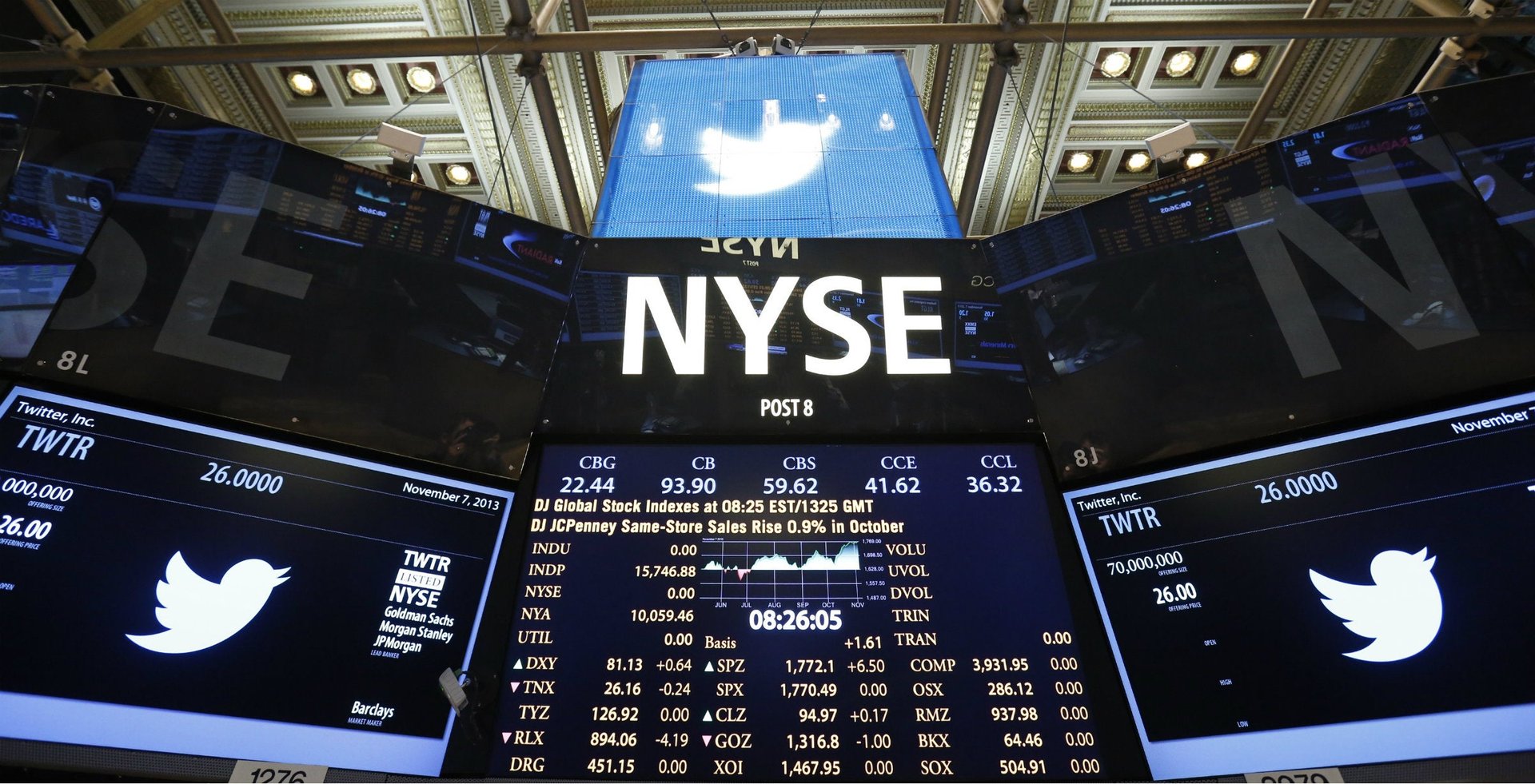The biggest winner in Twitter’s IPO was Wall Street, not Silicon Valley
Sure, Twitter’s IPO was fun. Guys in funny jackets were shouting. Captain Jean-Luc Picard rang a bell with some girl in a tutu. Twitter’s founders pretended not to hate each other. CEO Dick Costolo used so many buzzwords he ran out of breath. It was a carnival of capitalism.


Sure, Twitter’s IPO was fun. Guys in funny jackets were shouting. Captain Jean-Luc Picard rang a bell with some girl in a tutu. Twitter’s founders pretended not to hate each other. CEO Dick Costolo used so many buzzwords he ran out of breath. It was a carnival of capitalism.
Besides that, common shares of Twitter actually began changing hands without a glaring technical disaster. And the pop? Don’t even get us started on the pop! The shares priced at $26 on Wednesday night, and the stock finished trading on Thursday 73% higher. (At times during the day, it was up more than 90%.)
For San Francisco’s would-be Dorseys, who’ve embraced Twitter’s success as another indication their own inevitable day of triumph lay just around the corner, this is great news, right? Maybe. But for the the tech industry as a whole, Thursday looks like a decided loss to its long-time industrial rival: Wall Street.
Let’s go back to that “pop.” A first-day surge in shares has long been seen as a sign of a successful debut. And because of that, the Wall Street investment bankers who manage IPOs—by gauging investor interest—try to tilt the balance between supply and demand in order to generate the proper result when shares hit the market. In other words, they usually underprice the offering a bit.
But outside of the favorable optics, a first-day share price surge does precisely nothing for the company. That’s because Twitter gets its money the night before the stock starts trading publicly. (That’s when the stock “prices,” which means Twitter sells its shares to the underwriters and collects a check. In this case, the check was for $1.82 billion.)
But if you’re cynical, a big “pop” in shares isn’t a good thing. It’s a sign the company left a lot of money on the table. If people were so desperate to get the shares, the company could have charged more per share, and would have collected more cash in the IPO. Instead, an underpriced offering effectively puts a windfall in the hands of Wall Street underwriters, who can steer it toward the preferred clients who are granted access to shares through the IPO. (The shares typically end up with large institutions that send a lot of business Wall Street’s way.)
Why this is a loss for tech
Once upon a time, tech behemoths saw their IPO as yet another opportunity for innovation.
Starting in the 1970s, untested tech companies had a habit of going public on their own terms. They habitually listed shares on the all-electronic Nasdaq rather than the pricier, more restrictive NYSE. (The NYSE also had much more rigorous listing standards at the time.) As the tech industry grew, the habit stuck, turning the Nasdaq into the epicenter of the tech stock boom of the 1990s (and later, the bust).
When Google went public in 2004, it didn’t leave the pricing of the shares up to Wall Street. Instead, it turned to an auction-based IPO system and largely avoided sizable fees bankers had been salivating over for months.
And the tradition continued up to Facebook’s hotly awaited offering in May 2012. The social networking giant wrenched control of the offering out of the hands of its Wall Street bankers, repeatedly raising the price range and boosting the share count in the run-up to the IPO. The end result? Somewhat mixed.
Facebook got a seriously good deal on Wall Street, leaving little money on the table and forcing Wall Street underwriters to swallow a relatively skimpy 1.1% fee. (By comparison, investment bankers received 3.25% for their part in Twitter’s IPO Thursday.)
On the other hand, some blamed the stock’s wobbly start, in part, on the fact that there was little in the way of a positive pop. For three months, Facebook took took serious heat as its shares fell more than 50% and vaporized about $50 billion in shareholder value. Wall Street bankers knew just whom to blame. It was Facebook’s fault, they whispered.
Had Facebook’s offering gone smoothly, the firm’s hands-on approach to managing its offering might merely have been another example of how Silicon Valley justifiably refused to play Wall Street’s game. But it didn’t go smoothly. It was pretty much a disaster.
Facebook’s shares have more than recovered. But judging by Twitter’s IPO, the tech industry’s chipper attitude toward Wall Street hasn’t. Instead of the Nasdaq—which, fair enough, played a starring role in the Facebook mess—Twitter decided to list on NYSE, with all its quaint traditions, including involvement of actual humans in the trading.
And now there’s the pop. The shares closed up 73%. That’s the sixth-largest first-day surge on record. For a bit of context, between 1990-2009, the first day pop on an IPO averaged 22%, according to analysts from the Motley Fool.
Of course, it’s possible that Twitter’s top brass knew the shares were underpriced, but thought it a price worth paying for a successful offering. Or it could be that Twitter took more of a laissez faire approach to the entire process and left it in the capable hands of their underwriters. Either way, Twitter’s IPO was done on Wall Street’s traditional terms. And for an industry that boasts relentlessly about its ability to act as a disruptive force in American business, it’s hard not to see that as a loss.